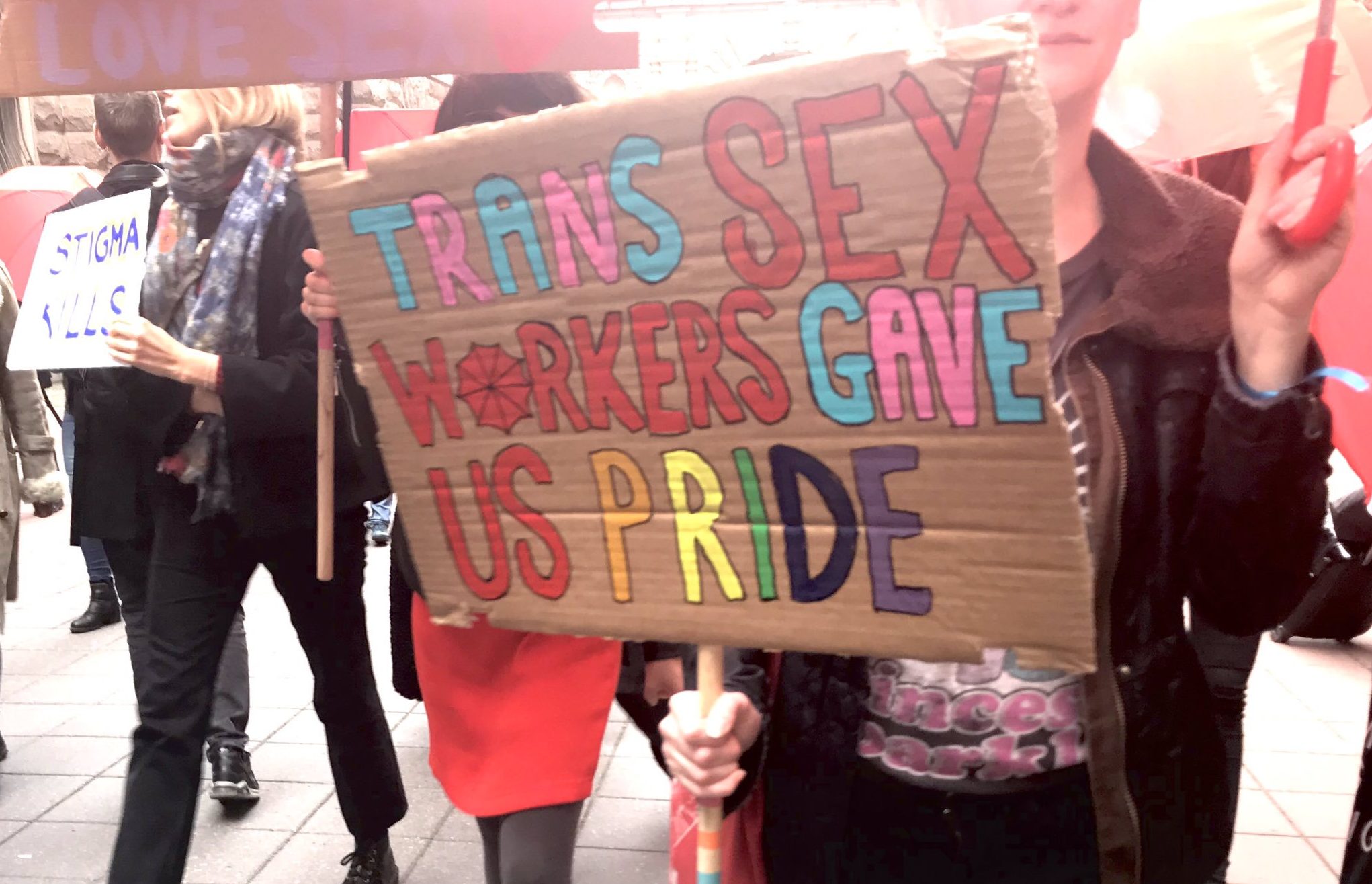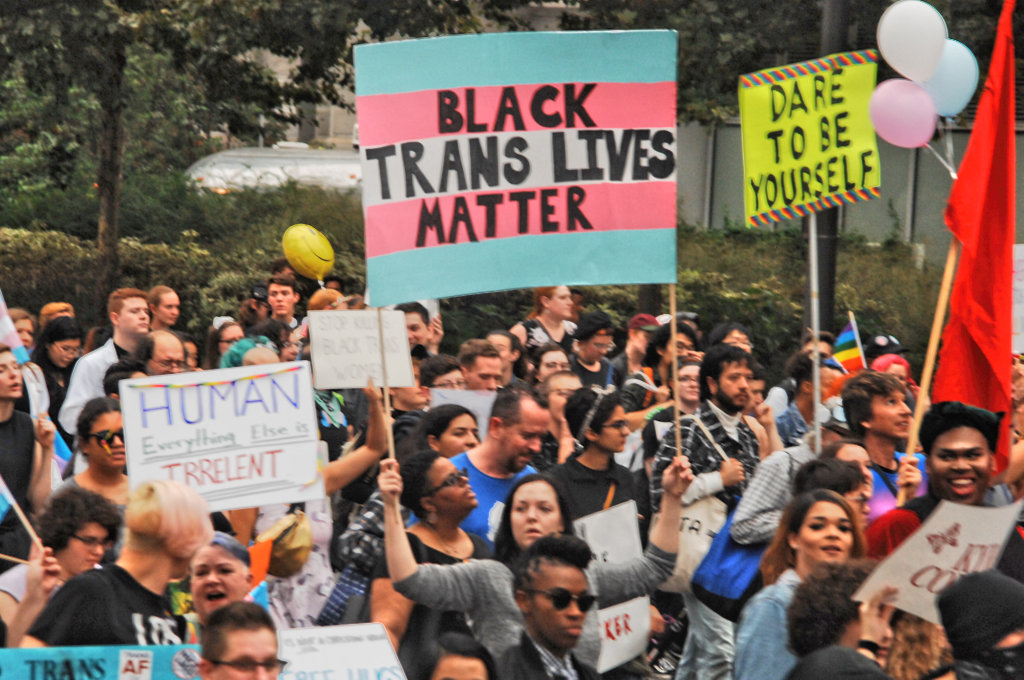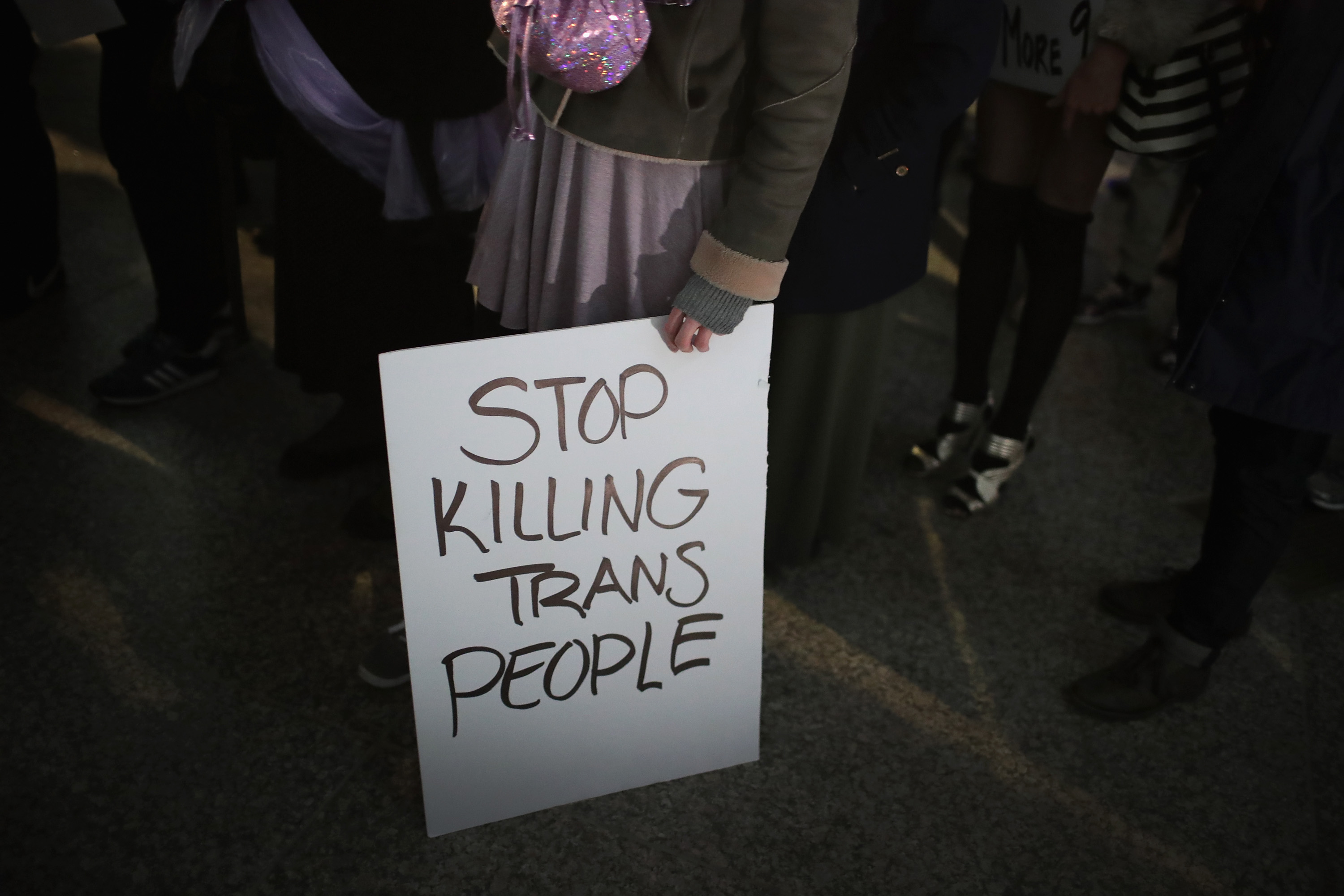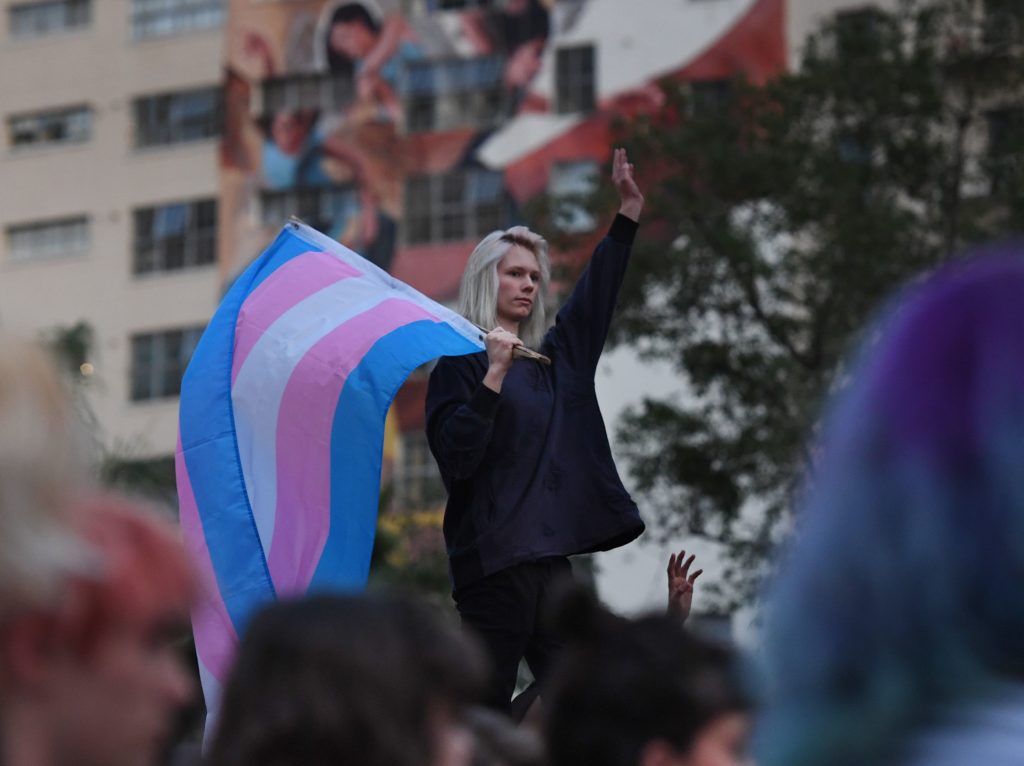A trans flag is waved at a protest against the Trump administration’s attacks on the LGBT+ community, California 2018. (MARK RALSTON/AFP/Getty)
Coronavirus is already highlighting the inequalities in our society.
The first moments of pandemic panic – which, in the UK, meant British people panic-buying toilet roll and other essentials – showed the divide: in this case, between those who could afford to stockpile supplies and those who couldn’t.
Then, there’s the gap between those whose jobs mean they can work from home, those whose jobs mean they are risking infection by taking packed public transport to work, and those working in the gig economy, for whom work has dried up entirely.
The mega-rich are fleeing to nuclear bunkers to ride out the crisis, while those without homes are sleeping rough, unable to self-isolate, and those living in poverty are relying on food banks that are suffering massive shortages in supplies because of wealthier people panic-buying due to coronavirus.
LGBT+ people are already more vulnerable to coronavirus for three significant reasons: as a community, we’re more likely to smoke; we have higher rates of cancer and HIV; and we’re less likely to seek medical care when we’re sick.
Within the LGBT+ community, transgender and non-binary people are more likely to experience mental-health issues, which a pandemic is likely to exacerbate; less likely to have a permanent job (widespread discrimination among UK employers means a third of UK employers won’t hire a trans person) with a stable salary and/or savings to fall back on; face shocking barriers to getting healthcare generally and are already seeing vital healthcare deemed “non-essential”, with multiple reports of surgeries and hormone appointments being cancelled.
For trans folk, these and other inequalities in society mean we’re more vulnerable during a global health crisis – and less likely to be able to access help.
A list of negative statistics showing how trans and non-binary people are vulnerable during this crisis could be unending. Instead, here is a list of 11 things you can do to help.
Donate to a hardship fund for sex workers.
Trans people, especially trans women, are more likely than the general population to be supporting themselves through sex work.
As more and more people self-isolate, sex workers are seeing a dramatic decrease in clients and work. Like other precariously employed workers, sex workers don’t have a monthly salary, don’t get sick pay and are less likely to have savings.
Sex workers’ rights campaign group SWARM (Sex Worker Advocacy and Resistance Movement) has set up a hardship fund for those in need. If you have the financial resources – especially if you have a salary – you can donate here.

Support What The Trans!?
What The Trans!? is a weekly, DIY news podcast run by two trans women. It is a beacon of hope, informed storytelling and well-aimed snark at the best of times, but is even more vital to the trans and non-binary community now.
Everyone should sign up for a weekly dose of trans news, and if you want to support their work they have a Patreon.
Crucially, What The Trans!? have also set up a discord chat for trans folks, for loneliness busting and solidarity during the pandemic. Trans and non-binary people can apply to join here. Cis people, please consider financially supporting their work instead.
Do you have trans friends? Call them!
Make sure the trans and non-binary people in your life know they’re not alone right now.
For people who are already more likely to be suffering from anxiety, depression, or other mental-health issues, the fear and panic around coronavirus can be hard to cope with.
Knowing there are people in the same boat and who keep checking in can be a genuine lifeline. Reach out to your trans friends.
Support the UK’s first homeless shelter for LGBT+ people.
Despite a lack of solid research, it’s fair to say that trans people are likely to be overrepresented within homelessness statistics, and this applies particularly to young people – research has found that young LGBT+ people make up as much as a quarter of the UK’s young homeless population.
You can donate to The Outside Project here, and on their Twitter you can find other ways of supporting them – fancy virtual, trans-led kickboxing classes? Your money will go towards vital services, like benefits advice for queers who are self-employed or on zero-hours contracts.
What do shelters need?
▫️Funding for 24hr opening and staff sickness
▫️Self-isolation housing for people with symptoms
▫️Complete foods & vitamins
▫️PPE: gloves, aprons, masks, hazmats
▫️Room dividers
▫️Handsoap
▫️Facial tissues
▫️Blue roll
▫️Cleaning supplies
▫️Free laundry pic.twitter.com/X4MGqpcd0a— The Outside Project (@LGBTIQoutside) March 16, 2020
Support Queercare and share its resources.
Queercare is a trans feminist network that helps people care for their communities, providing training, support and advocacy for trans and queer people in the UK.
It especially focuses on helping trans women and people who experience transmisogyny, and helps with everything from legal support to medical equipment.
Queercare is helping trans people (safely) care for trans people during coronavirus. Donate to support their work here or check out and share their list of resources for mutual support during coronavirus.
Donate to Bristol Mind to support its national trans helpline.
MindLine Trans+ is a national helpline from local mental-health charity Bristol Mind, currently running two nights a week.
The trans community is more likely to feel isolated, for a number of reasons, and Bristol Mind were already fundraising so that the helpline can increase to three nights a week.
They say that they are already seeing an increase in calls because of coronavirus. Donate to support the helpline for trans folks here.
If you want to talk to someone for general emotional support, please call our helplines
MindLine 0808 808 0330 (Wed-Sun, 8pm to midnight)
Transline+ helpline 0300 330 5468 (Mon and Fri, 8pm to midnight) or visit our website for info and signposting https://t.co/1sj42J4Bbg https://t.co/7rIeB2EKJ0— Bristol Mind (@BristolMind) March 16, 2020
Take food to a food bank.
Individual food banks tend to have a running list of the items they need the most, depending on demand. This is usually on their website or social media.
If not, here is a list of the items that are usually in shortest supply (and so are the best to donate).
You can find your nearest food banks here (Trussell Trust food banks) and here (independent food banks).

Read and share Galop’s guide to Trans Resilience in Isolation
The UK’s only specialist anti-violence LGBT+ charity, Galop, has put together a guide to coping with self-isolation for trans folks.
Read and share Trans Resilience in Isolation with your friends.
Share your skills with QTIPOC.
Unmuted Brum, a Birmingham-based organisation for queer, trans and intersex people of colour, is looking for people who can gift an hour of their time to give online sessions to other QTIPOC.
This is to help combat the mental-health issues being thrown up by the lack of routine.
Sign up to help here.

Donate to Galop to support the national LGBT+ domestic abuse helpline.
Social distancing and self-isolation are going to be a dangerous time for those who live in homes with domestic abuse.
Although research into this is patchy, one report from the Scottish Trans Alliance found that 80 percent of trans people had experienced abusive behaviour from a partner or ex-partner.
If you’re able, donate to Galop – which, among other things, runs a national LGBT+ domestic abuse helpline. They also have a dedicated trans advocacy helpline.
We don’t want anyone to feel alone or unheard in this difficult time. Our advocacy service is still open and you can contact us for support.
💻 https://t.co/Una1sOcXBL
📨 [email protected] pic.twitter.com/xACCMCbO5q— Galop (@GalopUK) March 19, 2020
Help Stonewall Housing to house and feed vulnerable queers.
Stonewall Housing have launched an urgent appeal to make sure that LGBT+ people have a safe space to be, and enough to eat, during the coronavirus pandemic.
Donate here.
We are mindful many of our service users will experience additional vulnerability during this period. We have launched an urgent appeal to provide everyone living in our supported accommodation with essential items.
Text donate CRISISFOOD to 70085 to donate £10 #LGBT+ #London pic.twitter.com/meN32dDKxH— Stonewall Housing (@Stonewallhousin) March 19, 2020
